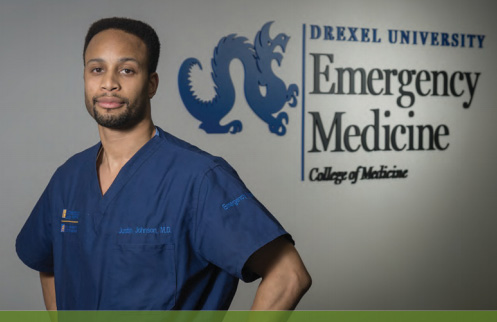Destination Excellence: The View From Residency
Diversity definitely exists at Drexel, but as with anything, there is room for improvement.
My experience is unique for many reasons. First, my primary, secondary and even collegiate schooling was populated 98 percent by African Americans. That said, there was still much diversity at my historically black alma mater, Hampton University. I believe that culture, not race, is what most identifies people. Thus, my college experience prepared me to interact with people who, although they looked similar to me, had a range of cultural differences.

Justin Johnson, MD ’13, is a trainee in the Drexel/Hahnemann Emergency Medicine Residency program.
In medical school at Drexel and then residency here as well, I have made good use of my experiences in exploring personal relationships with people from different cultures. I will admit, though, the fact that now many fewer people look similar to me took some getting used to. I believe Drexel is great at employing many minorities, and even majorities that do not make people feel like minorities.
I think areas for improvement would include having more underrepresented minorities in leadership roles. With all of the residency programs at Drexel each having the positions of department chair, program director and assistant program director, minority representation is scarce.
It would be good to see more people from underrepresented minorities reach out to other minorities. I feel I’ve had many majority supporters and mentors reach out to me during my time here, which is great. I can only say that Drs. Nathalie May, a supporter of mine, and Ted Corbin, my current mentor, who are both African American, reached out to me from the minority pool.
I also wish there were more underrepresented minorities in my residency program, but I may be asking a bit much. I understand that the number of African Americans in medicine is at a 20-year low. The number of African Americans applying to medical school has declined, especially among young men. According to the Association of American Medical Colleges, more African-American males applied to (or enrolled in) medical school in 1978 than in 2014.

“I feel my African American patients are often pleasantly surprised to find I am their physician.”
From my clinical perspective, I feel my African American patients are often pleasantly surprised to find I am their physician, often saying I look like a friend or relative. I like to think that means they are more comfortable and tell me information more readily than if I were different from them — a problem known often to minorities and contributing to a mistrust for medicine. I always feel extremely comfortable chatting with staff, who are predominantly minorities, and they always seem to be a little proud to see me as a physician here. Taken all together the experience here has been great and one that I know is not found at all institutions.
— Justin Johnson, MD ’13
Emergency Medicine Resident
Back to Top